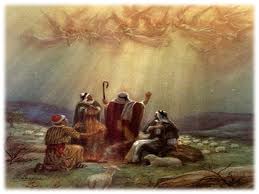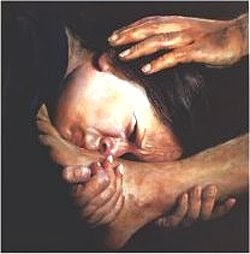“My Kingdom is not of this world. If it were, my servants would fight to prevent my arrest by the Jews. But now my Kingdom is from another place.” ~Jesus
 I don’t know how many guns there are inside our church building on Sunday mornings. I don’t want to know. I’m guessing around fifty but, again, I’m not sure and I seriously don’t want to know. We operate mainly on a don’t-ask-don’t-tell policy on that around here. In light of the recent mass shootings — asking “Which one?” is a legitimate question and a terrible commentary on our sick society — I’m afraid more and more disciples of Jesus are bringing their firearms to our public worship assemblies. And using the Bible to justify it.
I don’t know how many guns there are inside our church building on Sunday mornings. I don’t want to know. I’m guessing around fifty but, again, I’m not sure and I seriously don’t want to know. We operate mainly on a don’t-ask-don’t-tell policy on that around here. In light of the recent mass shootings — asking “Which one?” is a legitimate question and a terrible commentary on our sick society — I’m afraid more and more disciples of Jesus are bringing their firearms to our public worship assemblies. And using the Bible to justify it.
A recent front page column in the Church of Christ publication The Christian Chronicle quoted a dozen ministers from a dozen different congregations in several states who believe and, apparently, teach that carrying a gun and being prepared to use it against another human being is a good thing to do.
Some of the comments spoke to the realities of guns in the church building and Christians’ readiness to use them to protect themselves against an invader. A minister in Florida said “walking in with the intent to harm our congregation would be like walking in to harm someone at an NRA rally or gun show.” A minister of another church in Florida told the Chronicle that lots of people in his congregation are packing and “someone would be sorry to try anything here.” A Mississippi CofC minister said of his church’s strategy, “We remain vigilant, and we have selected brethren who have a tactical background and are armed amidst our assembly. Unfortunately, we can’t ultimately eliminate the threat, but we can definitely minimize the impact it could possibly have on our beloved.”
Some of the preachers interviewed even attempted to say shooting a criminal inside the church building is the “Christian” thing to do. In describing a scene in which an active shooter begins opening fire in a worship assembly, one minister from the Houston area said, “There is a world of difference in being ready to die for your faith than to die at the hands of a crazy man simply because he’s crazy. I believe that God would permit me to protect myself and my family in cases such as that.”
A minister in Kentucky went so far as to claim that Christians are required to shoot when he said, “We believe theologically we have an obligation to protect and defend our church membership, especially children, against a stranger or angry member who was to come in and begin shooting.”
A preacher in Alabama who admits to bringing his own Ruger .380 to the church building on Sundays invoked the name of Jesus in justifying the use of deadly force by a Christian: “I do not believe that Jesus — or even the old law — taught members to cower in the face of danger. It was Jesus who told his apostles to take a sword in Luke 22.”
OK. Stop right there.
Two things.
One, you cannot use the name of our Lord to justify the killing of anyone under any circumstances. Ever. Yes, Jesus would protect those under attack, not by killing the attacker but by stepping in front of the bullet. And he would forgive the attacker and pray for him while he was dying. I’m always surprised to hear Christians say, “Jesus would not allow himself to be a victim.” Actually, our Lord willingly left his home in glory, put all of his trust in the One who judges justly, and purposefully submitted to being the worst kind of victim. He blessed those who attacked him, he loved those who hated him, he forgave those who killed him. I’ve heard other Christians acknowledge that truth about our Lord and then reply, “Well, Jesus wouldn’t shoot anybody, but I would.” That actually makes you, by definition, not a Christian.
Two, Jesus’ words in Luke 22 do not authorize the use of gun violence in any way. Jesus is telling his disciples that things have changed. The first time they went out, they were all welcomed with goodwill and hospitality. But now, when they are scattered, they are going to face opposition. They’re going to be ridiculed, rejected, and maybe even killed. Now, Jesus says, you’re on your own out there. Don’t count on other people to help you. You’re going to need a purse, a bag, a sword, whatever. He’s speaking figuratively. He doesn’t discount in this moment every word out of his mouth for the past three-plus years against violence. He’s not saying the opposite now of his every teaching against violence. He’s speaking symbolically. How do we know? Because when the disciples reply, “Look, Lord, we’ve got two swords right here,” Jesus rebukes them, “Enough, already! Stop!”
Yes, you’re going to face an intense opposition to me and my message, your very lives are going to be endangered. But you don’t respond with self-defense and violence. Enough! You’re missing the point! Jesus will have nothing to do with swords, even for defense. How do we know? Because later on in this same chapter, in the very next scene when Jesus is being arrested, one of the disciples asks him, “Lord, should we strike with our swords?” And Jesus says emphatically, “No!”
One of the Christ-followers uses his sword to cut off the ear of the high priest’s slave. And Jesus sharply rebukes him. “No more of this! Stop!” And he heals the injured attacker. In Luke 22, literal armed resistance is exposed as a foolish misunderstanding of Jesus’ message.
Could the Scriptures be any more plain? The question is asked, “Should we strike with our swords when we’re being attacked?” and the direct answer from our Lord is “No!” I’m not sure why we even have these arguments.
Of all the ministers quoted in the Christian Chronicle article, only one expressed a theological and scriptural objection to the use of gun violence by Christians in self defense: Tyler Jarvis, the student and family minister for the Oak Ridge Church of Christ in Willow Park, Texas. “I think that the church should trust in the protection and mercy of God, even if it means not being able to defend against an attacker or intruder. The church ought to be able to extend love and forgiveness to those who wish to harm them, even if it costs them their lives in the process.”
The author of the story introduces Jarvis’ quote by saying the Willow Park minister “wrestles with the gun question.” It doesn’t sound like he’s struggling to me.
There are many reasons Christians in the U.S. believe it’s OK to kill people in self-defense. Culture plays a role, society has something to do with it, fear informs our understandings, and there appears to be a general unwillingness to carefully think things through and reflect. It doesn’t help when Christian publications present such a lopsided view of the issue. This article normalizes gun violence as if there’s no choice. It accepts the culture’s position and approves it for God’s Church. There’s no theological challenge, just an out-of-context proof text. If you must present both sides — I think you must! — at least present them equally.
Since when is showing unconditional mercy and love and grace and forgiveness in the face of danger and death labeled as cowardly? Since when is praying for our enemies and refusing to repay evil for evil and sacrificing self preservation for the sake of the sinner viewed as “cower[ing] in the face of danger?” Our Lord was not cowardly in the Garden of Gethsemane that night. And he didn’t cower in the face of danger when he willingly submitted to the cruelty of the cross. Neither are Christians who reject the use of violence to get their way. They are courageous and brave, faithful and true.
Christians, leave your guns at home this Sunday. Practice prayer. Practice forgiveness and mercy. Practice discipleship and obedience to the Way. Pray to God that nobody with violent intent ever attacks your church family in the sanctuary. But also pray to God for the strength, should it ever happen, to respond in ways that will honor our Lord, the Prince of Peace.
Peace,
Allan








Recent Comments